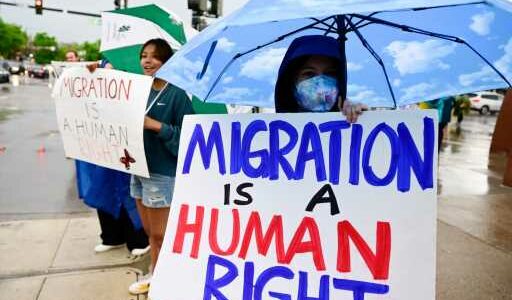
Denver worries about record migrant counts as Texas sends more buses
Texas Gov. Greg Abbott sent more than 10 buses transporting migrants to Denver in the last week, Mayor Mike Johnston said Tuesday morning as he told City Council members that the number of arrivals could reach an all-time high.
Another four buses from Texas arrived during the day, a city spokesperson confirmed.
The influx comes as the flow of migrants across the southern U.S. border with Mexico has increased in recent weeks. When Johnston took office in mid-July, the number of migrants in city shelters ranged from 400 to 500 people, he said. As of Monday, the number stood at 1,656 — within a few hundred of the peak at shelters amid the initial surge, when the city declared an emergency.
“With the addition of new buses this week, we could eclipse, potentially, the high water mark of more migrants than we’ve had in shelter in the city at any point … since the crisis ever began,” Johnston said during the weekly Mayor-Council meeting.
The mayor said the new surge wasn’t yet cause for a new emergency declaration. He said the systems the city put in place earlier were still working.
But his office was “moving aggressively” to find places to use for congregate shelter, Johnston said, and officials were asking government, nonprofit, faith and even school district leaders throughout the state to help. The city also was working to increase staffing.
“We believe this is not Denver’s problem to solve alone,” Johnston said.
This is not the first time the Texas governor’s office has organized transportation to other states for migrants who’ve entered Texas from the southern border. Abbott set the first busload of Denver arrivals in May, and the bus trips have continued since then.
Abbott and other Republican governors have been busing migrants arriving in their states to states and cities led by Democratic leaders, in part to make a political statement.
Before Abbott’s move in May, the hundreds of mostly Venezuelan asylum-seekers who had come to Denver each week through El Paso, Texas, had arrived on commercial buses, seeking assistance to get to their final destinations. Many of them are fleeing economic and political conditions, along with violence, as they seek better lives for their families.
Asked for comment, Abbott’s media team referred The Denver Post to a message posted on social media Tuesday, in which the governor’s office wrote that he would keep sending migrants to so-called sanctuary cities “to relieve overwhelmed border towns.” That included more than 1,800 people to Denver.
It was unclear if the migrants who have been transferred recently to Denver were already planning to travel to the city. In May, many of those who were on the state-chartered bus already had family or immigration appointments in Denver.
Colorado also came under scrutiny earlier this year for coordinating transportation for migrants to other states, including New York. But state leaders said those trips were not politically motivated, as they were helping asylum-seekers travel elsewhere at their own request.
Denver has provided shelter and support to 19,527 asylum-seekers from the southern border since the arrivals began at the end of last year, at a cost of about $26 million, according to the latest emergency management update. The state has reimbursed $3.5 million in costs, and the federal government has covered $909,000 of those expenses.
The U.S. Department of Homeland Security also plans to provide another $8.6 million in funding to the city.
Plans to hire a contractor to operate the city’s migrant shelter services fell apart under the outgoing administration of Mayor Michael Hancock, just before Johnston took office. Denver halted the hiring of private security company GardaWorld in response to increasing backlash over the company’s history of alleged abuses and mistreatment.
The renewed migrant surge could deplete the money city leaders have set aside faster than expected, though Johnston voiced optimism Denver could save money if it’s able to line up more shelter space and rely less on hotels.
City officials are now drafting a new solicitation for outside providers to shelter and support the migrants arriving in Denver. Johnston said this request for proposals will look different than the last one — reflecting some changes council members and nonprofits requested, including avoiding the hiring of one single large contractor.
The solicitation “will make it easier for local and small organizations to bid on specific services rather than the full continuum of care,” mayoral spokesperson Jordan Fuja told The Post.
The city is now spending about $5,000 per person per month, Johnston said, so Denver is still relying on state and federal assistance — in the form of more than money.
Denver is among cities that successfully lobbied President Joe Biden’s administration to grant temporary legal status to migrants and asylum-seekers from Venezuela, which allows some to receive work authorizations. That decision last week will allow them to work and support themselves and their families while they work through the asylum process.
And the city will spend less money on sheltering, Johnston said, when more congregate shelter options become available. That option is less expensive than hotel stays, and the federal government provides reimbursement only for congregate sheltering.
Stay up-to-date with Colorado Politics by signing up for our weekly newsletter, The Spot.
Source: Read Full Article
